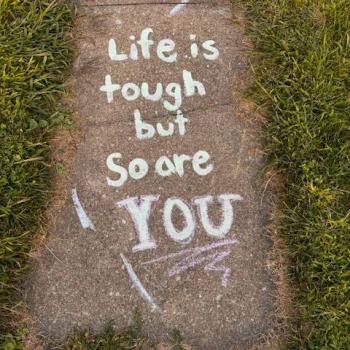Why is everyone anxious?
In this post, I want to look at what the 16th century philosopher Jaques Rousseau can teach us about being anxious. One of the many questions I field in any given week is “what is wrong with the people these days?” I don’t claim to be an expert, but I have a high amount of training and exposure to psychology, theology and philosophy to competently answer, “it is complicated”.
There is a concept in psychology known as the invisible or imaginary audience. Showing up somewhere between 9 and 11 years old, the concept of the ‘imaginary audience’ is a psychological phenomenon predominantly observed during adolescence. It refers to the belief that a group of onlookers are constantly watching and evaluating one’s appearance and actions, leading to heightened self-consciousness. It is thought that as a child grows up, moves into later adolescence, then finally adulthood, the pressures of the imaginary lessen and finally go away.
Unfortunately, these days, I see a lot of people in my professional counseling practice stuck under the pressure of the invisible audience. I attribute many factors to this phenomenon, specifically, the breakdown of family and societal systems and the prevalence of electronic mediums such as TikTok, Facebook and other platforms. Pathologically, I have observed an increase in depression, body dysmorphias, phobias and other anxiety conditions related to these pressures.
The Problem with Narcissism
The problem with the imaginary audience is that I have observed it to lead to a number of manifestations of narcissism. In classic psychology, narcissism (Greenberg, 2017):
Narcissistic Personality Disorder (NPD) is the name for a series of coping strategies that began as an adaptation to a childhood family situation that left the person with unstable self-esteem, the inability to regulate their self-esteem without external validation, and low empathy. As with all three of the major categories of personality —Borderline, Narcissistic, and Schizoid—people with NPD also lack “whole object relations” and “object constancy.”
The problem with any personality disorder is that it is awful for maintaining and sustaining long term friendships and relationships.
16th Century Insight
Jean-Jacques Rousseau (1712-1778) was a Swiss philosopher whose work both praised and criticized the Enlightenment movement. Although a believer in the power of reason, science, and the arts, Rousseau was convinced that a flourishing culture hid a society full of inequalities and injustices. Rousseau believed in a Stoic simplism and that human beings were good by nature. Among the plethora of ideas and works Rousseau was known for, here, I would like to comment on his competing notions of amor de soi and amor prope. How we approach these two concepts can determine how we sometimes experience being anxious.
Amour de soi (self-love)
Rousseau attributes to all creatures an instinctual drive towards self-preservation. We can call this the righting reflex. Babies and children are necessary narcissists because they have not yet learned self-control and sometimes have not gained the trust of their caregivers that they will be provided for. Second to this point is that parents sometimes do not set good boundaries and enact healthy discipline for their children. I am always telling parents that if you do not create meaning for your children, they will create their own.
The human drive towards self-preservation according to Rousseau directs us to attend to our most basic biological needs. For Rousseau, “humans, like other creatures, are part of the design of a benevolent creator, they are individually well- equipped with the means to satisfy their natural needs. Alongside this basic drive for self-preservation, Rousseau posits another passion which he terms pitié (compassion). Pitié directs us to attend to and relieve the suffering of others (including animals) where we can do so without endangering our own self- preservation. In some of his writings, such as the Discourse on Inequality, pitié is an original drive that sits alongside amour de soi, whereas in others, such as Emile and the Essay on the Origin of Languages, it is a development of amour de soi considered as the origin of all passions.” (Bertram, 2023).
Amour prope – (love of self, pride, vanity)
Amour propre makes the need to be recognized by others as having value and to be treated with respect central to the felt interests of each human being. Here, we see the toddler and school aged child (5-7) who needs constant validation in their world. Here again, we see the adolescent who is jockeying to be seen and validated by their peers. This inevitably leads the child or teenager to feel anxious.
Here, Rousseau sees amour prope a negative passion and a “source of evil” (Bertram 2023. And here, we begin to see the Stoic simplism that pervades Rousseau’s thoughts. Rousseau believed much of this behavior developed from modern civilization/ urbanization. “Although Rousseau held that the overwhelming tendency, socially and historically, is for amour propre to take on toxic and self-defeating (‘inflamed’) forms, he also held that there are, at least in principle, ways of organizing social life and individual education that allow it to take on a benign character.” (Bertram, 2023)
Rousseau’s concepts are part of a larger body of work known as his social contract. I am lifting them out of context a bit to highlight an existing problem we are observing in our world these days. We are not outgrowing the imaginary audience and we are not living our best lives for the sake of building up of others. We instead are living our best lives for the sake of ourselves, our image. We worry too much about what people think about us.
Finally, thoughts on anxiety
Carl Jung, the psychoanalytic psychiatrist suggested that there are two halves of life. According to Jung,
“The first half of life is spent building our sense of identity, importance, and security —what I would call the false self and Freud might call the ego self. Jung emphasizes the importance and value of a healthy ego structure. But inevitably you discover, often through failure or a significant loss, that your conscious self is not all of you, but only the acceptable you. You will find your real purpose and identity at a much deeper level than the positive image you present to the world.
In the second half of life, the ego still has a place, but now in the service of the True Self or soul, your inner and inherent identity. Your ego is the container that holds you all together, so now its strength is an advantage. Someone who can see their ego in this way is probably what we mean by a “grounded” person”. (Rohr, 2015)
We need to go through this second half of life, and we need to feel anxiety. Both experiences are normal and signs of growth. In the second half of life, it is normal to not care so much about what people think of you. You are no longer interested in keeping up with others. Perhaps you have your family, your career and you may well be entrenched in life. You often no longer have to become anyone; you simply need to let life become present for you. See my previous post on becoming: https://www.patheos.com/blogs/loveopensdoors/2024/04/becoming/
Reference:
Bertram, Christopher, “Jean Jacques Rousseau”, The Stanford Encyclopedia of Philosophy (Summer 2023 Edition), Edward N. Zalta & Uri Nodelman (eds.), URL = https://plato.stanford.edu/cgi-bin/encyclopedia/archinfo.cgi?entry=rousseau
Greenberg, E., PhD (2017, August 17). The Truth About Narcissistic Personality Disorder. Psychology Today. Retrieved April 28, 2024, from https://www.psychologytoday.com/us/blog/understanding-narcissism/201708/the-truth-about-narcissistic-personality-disorder
Rohr, R., PhD (2015, October 12). The Two Halves of Life. Retrieved April 28, 2024, from https://cac.org/daily-meditations/two-halves-life-2015-10-12/













